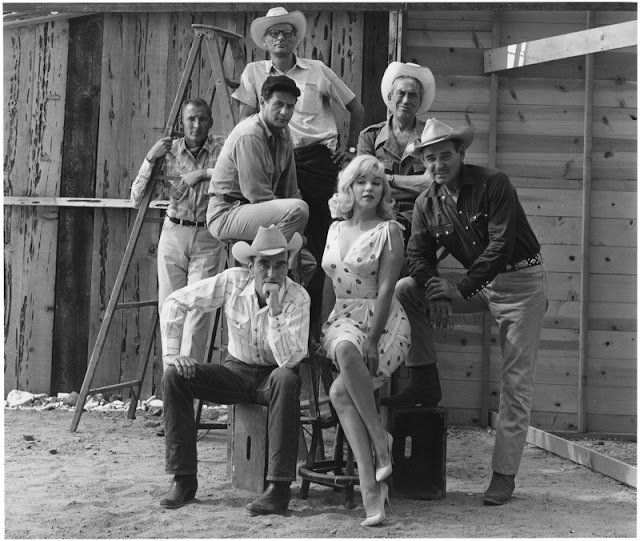"The centre cannot hold" - The Artistic Failure of The Misfits
“Things fall apart; the centre cannot hold.” These were the words
buzzing around my head as I left the British Film Institute after a screening
of The Misfits a few weeks ago. And when I came across a startling
photograph (below) taken on the set of that film, W. B. Yeats’ line served as the
perfect summation of how I felt about a piece of work that was to be the
swansong for two of the biggest names in the history of film.
Just take a look at the photograph. On the right: Clark Gable, the King of Hollywood, his features grizzled, his glory fading. At the bottom left: Montgomery Clift, steely, yet betraying a hint of vulnerability with that slight turning in of his left foot. The centre: Marilyn, luminous, mesmerising. The top centre: Marilyn’s husband, the playwright Arthur Miller, spectacles on a stepladder, the intellect needing a peg up to be seen. At the top right: attempting to hold that centre together, the director John Huston. There are few photographs this star-studded. There are few photographs as poignant and tragic. Gable will be dead two days after filming finishes. Marilyn, soon to be divorced from Miller, will be dead two years later. Clift will be gone in four.
It’s
these tragic biographies that weigh the film down. You cannot view Gable’s
performance without looking for signs of an exhaustion that will bring on heart
failure. When you watch him violently dragged around the desert in the
tail of a feisty mustang stallion – he did his own stunts – you are not gasping
at the drama, but thinking instead about the rate of his pulse. Clift’s
character, boozy, reckless, and vulnerable – throwing himself, twice, into the
fray of the rodeo - is too much of a facsimile of the real person. You
can’t help but equate his tumbles from horse and bull with the car accident
that had sent him into a spiral of pain and self-destruction. And then, of
course, there’s Marilyn. The on-set history is unavoidable. As her
marriage disintegrated she slipped slowly but surely into alcohol and
prescription drug abuse. The latter would cause Marilyn to oversleep, delaying
filming, and at one point she was hospitalised for two weeks bringing the whole
proceedings to a temporary halt. And what impact must this have had on the
lines that she was given? Her soon to be ex-husband, constantly rewriting and
tinkering with the script – remember, the film begins with Marilyn’s character
getting a divorce in Reno - surely these ups and downs must have coloured
Miller’s writing?
 |
Honey,
nothing can live unless something dies.
|
Indeed, the film is loaded with jarring and overwrought speeches, hinting towards enmity and conversations that have already, painfully, taken place. Or maybe those hints are a product of the biography. It’s impossible to subtract the legends from the substance of the story. It’s a kind of cultural rubber-necking – no matter how you try, you cannot ignore the heartbreak and tragedy that’s clearly happening before your eyes. Remember, Miller is not putting words into the mouth of a failed salesman. Or writing lines for a vain Reverend seeking scapegoats in historical Salem. He's writing lines for his wife.
 |
| Arthur and Marilyn |
It’s not that they’re not great individual lines. When the just about to be divorced Rosyln (Marilyn’s character) tells her husband “If I’m going to be alone, I want to be by myself” you should really be caught up in the aphoristic beauty of what the character has just said. Instead, you can’t help looking behind the curtain and wondering about the disintegration of Marilyn and Miller’s marriage.
But
then all this reveals the paradox. The reasons behind the film’s artistic
failure – and it is a failure – are gripping. And if I’m honest, it’s why I
chose to watch this in the BFI’s Marilyn season instead of, say, Some Like it
Hot or The Seven Year Itch. Things do fall apart in The Misfits, but that is
what is ultimately so compelling.




Comments
Post a Comment